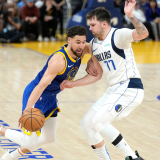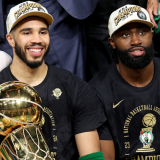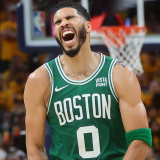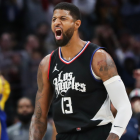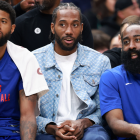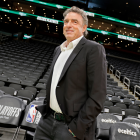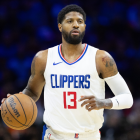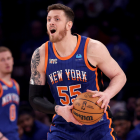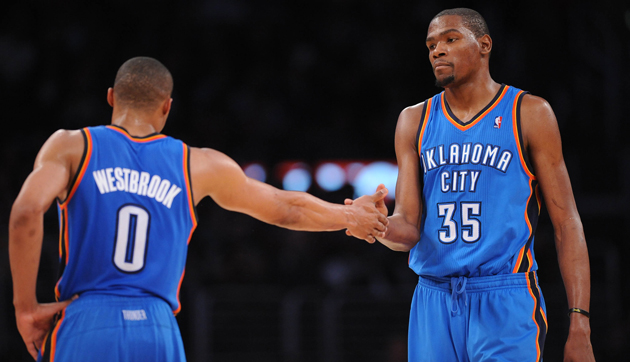 |
| OKC's All-Star duo seems poised to take the next step. (Getty Images) |
In an ongoing series, CBSSports.com Eye On Basketball will take a look at the leading championship contenders as they head into the NBA playoffs. First up: the Oklahoma City Thunder.
Fortune 500 companies often preach "continual improvement," the idea that competitive greatness is attained by pursuing a non-stop effort to make regular, incremental changes to both processes and products. The doctrine basically boils down to a cycle of building, assessing and refining, working out the kinks and incorporating the latest and greatest along the way. There may be certain benchmark goals in mind (revenue or market share targets, for example) but the idea is to be goal-oriented without being goal-obsessed. Fixating on an end result can be a distraction; doing things correctly and continually improving should get you where you want to go eventually.
The modern NBA's "continual improvement" prototype is clearly the Oklahoma City Thunder, a franchise whose from-the-bottom rebuilding effort has been hailed as a "model" for years now. The Thunder have gone from awful (2008 and 2009) to very good (2010) to great (2011) and now, with less than a month remaining in the playoffs, they stand poised as 2012's clear Western Conference favorites.
Last year at this time, there was a feeling that perhaps the Thunder were improving too quickly for their own good, that the youngsters without a playoff series win under their belt would struggle to handle post-season adversity. OKC was still incorporating center Kendrick Perkins -- acquired in a trade deadline deal -- into the fold and there were questions about how both of their All-Stars, Kevin Durant and Russell Westbrook, would stand up to the postseason glare. Also, did the Thunder have the size to match up with the likes of the defending champion Los Angeles Lakers?
It's fair to say that the Thunder have snuffed out virtually every major question that faced them 12 months ago. Through Friday night's games, OKC sits in the West's No. 1 seed with a record of 39-12, good for a ridiculous .765 percent winning percentage. The Thunder own the West's best home and best road record, and they have the West's best in-conference record too.
A look at the advanced numbers reveals that the wins aren't stockpiling by accident. Thanks to an attack that includes three players (Durant, Westbrook and reserve guard James Harden) who boast elite shot-creating and shot-making skills, OKC leads the NBA in offensive efficiency and raw points per game. Their attack is bolstered by a knack for getting to the free throw line and then converting: the Thunder have attempted the third most free throws in the league and have hit them at 79.7 percent, tops in the league.
The offense has shown incremental improvements from last season, when OKC was the NBA's fourth best unit. The emergence of Harden has been the biggest, as he's averaging nearly 5 more points per game (17.1) over last season (12.2) and shooting 6 percent better from the field (now at an excellent 49.3 percent). Durant, meanwhile, has posted virtually identical scoring numbers, but he's improved his shooting efficiency (now shooting above 50 percent from the field and 37.6 percent from deep) while also displaying a new commitment to the glass, posting a career-high 8.1 rebounds per game. Westbrook, too, has improved his raw scoring output (from 21.9 to 24.4 points per game) while improving his shooting (47.5 percent, up from 44.2 percent).
That's right: three players who combine to take 49 attempts per game managed to substantially improved both their collective scoring and shooting efficiency this year. Taken together, Westbrook, Harden and Durant are all now in the top-4 league-wide at their position for player efficiency. No other team in the NBA can match that feat; the San Antonio Spurs are closest with Tony Parker, Manu Ginobili and Tim Duncan all top-6 at their position. That's a machine producing scary good numbers; that Durant (23), Harden (22) and Westbrook (23) are still at least three years removed from their primes is downright terrifying.
Surrounding the trio, OKC has posted minor improvements on the glass, upping their rebound rate from No. 6 last season to No. 4 this season. OKC has perhaps the best frontline depth in the West, thanks to a complimentary quarter that includes Perkins, Ibaka, Nick Collison and Nazr Mohammed. Durant's substantial improvement on the glass has been a major next step in his path towards becoming the best player in the NBA but Ibaka can't be overlooked here. Known primarily as one of the NBA's best shot-blockers (he was called "a top-5 or top-10" defender by Portland Trail Blazers interim coach Kaleb Canales this week), Ibaka also averages 3.2 offensive rebounds per game, a valued skill come playoff time as he has a knack for cleaning up the scraps created by Westbrook forays and for extending possessions in critical situations.
If this continual improvement thing hasn't been jammed down your throat enough at this point, guess what? The Thunder are better on defense too. Currently the No. 12 defense overall, the Thunder are the West's No. 4 defense, trailing only the Memphis Grizzlies, the Dallas Mavericks and the Lakers. They're only marginally better than last year's unit (which ranked No. 13 heading into the playoffs) but the core pieces have clearly benefitted this season from another year of experience playing together. The Thunder make their mark defensively by gambling and harrassing opposing teams on the perimeter, looking to turn teams over and get into transition as often as possible, an approach that starts with the fearless Westbrook.
In addition to Ibaka's paint-protecting and rim-guarding and Perkins' perpetual mean-mugging and foul-giving, the Thunder have Thabo Sefalosha as their designated perimeter stopper, as well as Durant, who has shown grown in his commitment to the defensive end this season. One of the few areas where OKC is not among the league's elite is defensive rebounding, and coach Scott Brooks will surely harp on his wings to lock in to hitting the boards hard during the playoffs.
To boil this down: the Thunder have won a lot, they've improved on offense, they've improved on defense, they've improved their rebounding and they've improved their experience by virtue of having another season together. Their focus on winning resembles that of an elite NCAA team. Their pre-game attitude is unmistakable: they expect to win and hope to dominate. As such, OKC has lost two games in a row just once this season and has never endured a 3-game losing streak.
If there's an Achilles Heel, it's Westbrook, whose distribution numbers represent the most glaring step backwards amidst the otherwise rising tide. Westbrook's dimes have dropped from a career-high 8.2 per game last season to just 5.5 per game this season, an eye-popping number given the talent around him. His turnovers, meanwhile, hover near four per game, among the league's leaders. As a result, the Thunder are below-average in assist rate and turnover ratio, two factors that can be postseason red flags.
These numbers can't be ignored but they come in a certain context. The magnifying glass treatment for Westbrook will certainly be back throughout the postseason. He's a better player than he was last season overall but the flaws that made him a lightning rod haven't gone away.Westbrook has looked for his own offense more this season, adding a mid-range jumper to his arsenal that he didn't have in previous seasons. As long as Durant, arguably the NBA's best clutch performer by the numbers, gets his touches and shots late in games, there's no problem. As long as the turnovers are the result of endless probing and offensive aggression rather than carelessness in the halfcourt or in late-game situations, there's no problem. But if Durant starts to float or Westbrook starts to get really loose? The struggles will begin and the hate will rain down again.
When it comes to playoff match-ups, the Thunder are currently as well-positioned as it gets. There are seven teams -- currently separated by 4.5 games -- that could potentially finish in the No. 8 seed and face off against the Thunder: the Memphis Grizzlies, the Houston Rockets, the Denver Nuggets, the Utah Jazz, the Phoenix Suns, the Minnesota Timberwolves and the Portland Trail Blazers. The Thunder are a combined 16-4 against those opponents, holding series advantages against all of them (except the Rockets, who managed a 2-2 split). In other words, you can pencil these guys into the second round without a second thought.
Forecasting the second round is difficult, as the Lakers, Los Angeles Clippers and Mavericks could all fall in the No. 4 seed. Without question, the ideal match-up there for the Thunder is the Clippers. Over a 7-game series, the Clippers simply don't have the personnel to stop Durant and the Thunder have Westbrook to keep up with Chris Paul and enough athleticism and fouls to give in their frontcourt to neutralize Blake Griffin. OKC simply dominates that match-up from players 3-10.
As CBSSports.com's Royce Young noted this week, the Thunder are no longer young enough to be bullied by the Lakers, and while L.A. still sports unmatched talent and size in the middle, their focus and depth still leave plenty of questions. The Mavericks, who eliminated the Thunder in last year's Western Conference Finals, probably have the best personnel to make life difficult for Durant. Dirk Nowitzki remains an impossible cover for anyone, including the Thunder, but the Mavericks' offense has taken a major step back this season and the absence of Tyson Chandler would seem to be a game-changer in a 7-game rematch between these teams.
The biggest threat to the Thunder in the West is the NBA's previous continual improvement model: the San Antonio Spurs. The Spurs are the only team in the West to hold a series advantage over the Thunder this season; they boast an MVP-caliber point guard capable of winning the match-up against Westbrook; they've got the defensive system and discipline in place to make OKC work for their points; they score in efficient bunches and have a match-up nightmare in Manu Ginobili; they have the best coach in the NBA; and their core is as tested and experienced as it gets. The Spurs managed two big wins over the Thunder this season and both came without Ginobili. That's a formidable adversary.
A realistic best-case scenario sees Oklahoma City drawing the Nuggets, the Clippers and then hoping the Lakers knock off the Spurs. Denver has been re-shaped by injuries and trade, the Clippers don't have the necessary cohesion and wing skill and the Lakers have no real answer for either Westbrook or Durant.
A worst-case scenario would involve Memphis slipping to the No. 8 seed, followed by Dallas in the second round and then San Antonio in the Western Conference Finals. The grit and grind Grizzlies wouldn't let them off easy, the Mavericks would present some mental hurdles given last season's result and the Spurs wouldn't be intimidated in the slightest.
But in both the best and worst case scenarios, the focus is on how each opponent will handle the Thunder and not the other way around. OKC is clearly the established target in 2012, a new role for a still young group that should be disappointed if anyone else represents the West in the Finals. The Thunder didn't get to this point overnight, although it sometimes seems that way given their youth. They got here by getting better and better and better and better, continuously.



